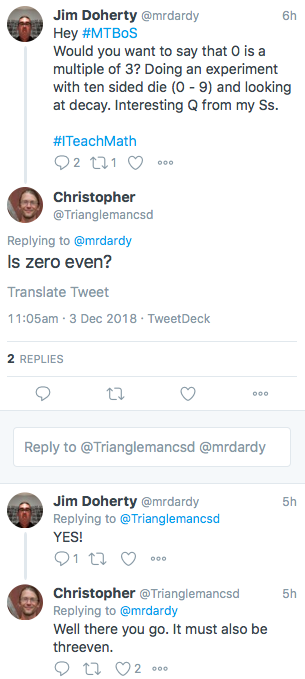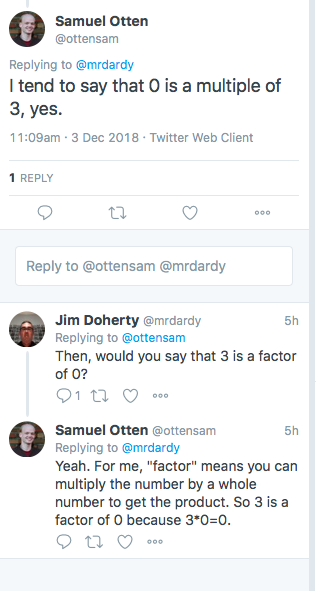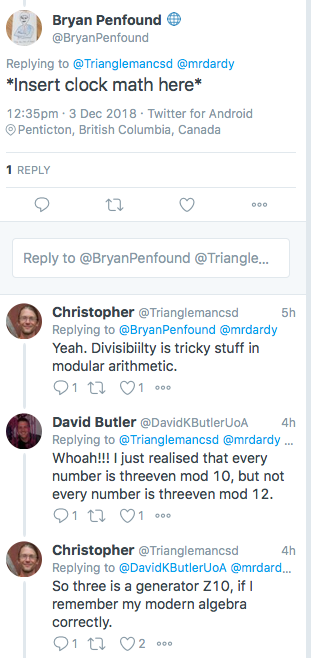In our Precalc Honors class we are discussing exponential and logarithmic functions now. I want to relate a fun observation/suggestion from a student a few days ago and a debate that fired up in class today.
Our text defines exponential functions as any function of the form y = a*b^x as long as b is positive and not equal to 1. One of my students, a girl named Shailee, suggested that it would feel more logical to simply say that b is greater than 1. This way, functions with a base between one and zero would instead have a negative exponent. This might make it more consistent to think about positive exponents representing growth and negative exponents representing decay. This also feels like a smoother definition for b instead of having two qualifiers, we’d only have one. Kind of a nice suggestion and one that I will be adopting for our class conversations this year.
Today I ran an activity that was suggested by Henri Picciotto when he came to do a workshop with my department in May of 2016. I had a couple of containers of 10 sided dice. They were numbered 0 through 9. I assigned a rule for each of my three groups. One group was to roll all the dice and count the number of evens. They then dispensed any that were not and rolled again. Lather, rinse, and repeat. The idea was that the number of dice remaining should model a half-life for them. The second group was looking for primes. Again, exponential decay with a base this time of 4/10. The last group was asked to look for multiples of 3. Someone asked if 0 counts as a multiple of 3. I reflexively said no but then paused and thought out loud about it. I threw the question out to twitter and we went on our merry way. We gathered data, plotted it on Desmos in a table and asked fro regression equations of the form y = a*b^x. Worked pretty well except one group went from 40 something dice down to something like 8 right away when they were supposed to have a 1/3 chance. We then checked in on twitter where interesting things were being shared. I’ll clip a few tweets below:


A side conversation also occurred when Christopher suggested that the 0 on the die was a 10 not actually a 0. This, of course, would have prevented this whole interesting conversation from happening in the first place. Anyways, this got a heated debate going in class where my students just felt uncomfortable about the idea of 3 being a factor of 0 since this implies, by a simple extension, that EVERY integer is a factor of 0. I guess we all accept without much debate that 1 is a factor of every integer, but this feels off somehow. I went off to lunch to bounce this idea off of some folks and I might have scared a couple of colleagues who are less comfortable with math. A lively debate/discussion at lunch led one colleague to casually say ‘So much just happened there’ When I returned to my classroom and my twitter feed the conversation had moved into a modular arithmetic mode. Here is a taste:

So, let me first say what an honor and a treat it is to share in a conversation like this with my students, my colleagues, and my virtual faculty lounge of folks spread around the globe. It is a mind-blowing thing to think about how much this world of education has changed for me since I took the plunge to going twitter. I am convinced (CONVINCED!!!) that life is better for my students since I did. I also want to say that the idea of modular arithmetic is one that I love to share with my students and I am determined to figure out how to find time to do so with my precalculus students since this debate brought up these ideas. I also have to admit that I am just a tad uncomfortable saying that every integer is a factor of 0. One of the side conversations at lunch went like this : Me – If 0 is a multiple of 3 then that means that 3 is a factor of 0. Rachel (science dept colleague) – If we say 3 is a factor of 0 wouldn’t we say that 0 is a factor of 0? Me – Uhmmm, this would imply that zero divided by zero is a thing, right? This reminds me of debates I had with a friend from my old college town debating the physical meaning of 0 ^ 0
So, a delightful lunch time conversation, right? Fun to lift the curtain a bit and have my students see a debate unfolding. Fun to get my brain agitated thinking about all of the implications of saying something as simple to my kids as ‘Look for multiples of 3’. Probably a lesson to think a little more carefully about my directions to them!
Many many thanks to Henri, Sam, Christopher, David, and Bryan for engaging in this conversation and for giving me the idea of this experiment.
Regarding your last point, I think 3 is a factor of 0, as is 0. But 0 is not a paired factor. That is, 0/0 is still not defined because 0/0 is “every real or complex number at once “.
I think it is all in how we define factor. The “goes into” idea is just shorthand. The definition i see is I think “n is a factor of k if there exists an integer m such that nm=k”. So 0 is a factor of 0.
I’m sure that there are times this fails. 0 is special it can have special rules.
Your definition is where I land on this issue as well David. But not until a bit of soul searching to convince myself. I liked the paired factor phrase and it makes me think of the key insight into the locker problem. Love these connections!
If 0 is a multiple of 3, then 3 is a factor of 0, then 0 is a factor of 0. This makes sense because:
0*n = 0
n = 0/0 –> indeterminate: n could be any integer, including 0 (or 3)
So both 0 and 3 are factors of 0.
Maybe this could work? (These math puzzles were always the best part of class)
Samarth!
Thanks for dropping by. Just around the time you were leaving this comment, a Professor from Australia was leaving me a tweet with a similar take. Excellent thinking by excellent minds.